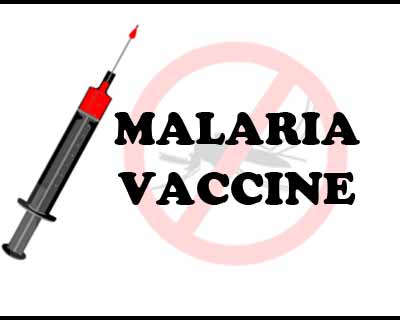- Home
- Editorial
- News
- Practice Guidelines
- Anesthesiology Guidelines
- Cancer Guidelines
- Cardiac Sciences Guidelines
- Critical Care Guidelines
- Dentistry Guidelines
- Dermatology Guidelines
- Diabetes and Endo Guidelines
- Diagnostics Guidelines
- ENT Guidelines
- Featured Practice Guidelines
- Gastroenterology Guidelines
- Geriatrics Guidelines
- Medicine Guidelines
- Nephrology Guidelines
- Neurosciences Guidelines
- Obs and Gynae Guidelines
- Ophthalmology Guidelines
- Orthopaedics Guidelines
- Paediatrics Guidelines
- Psychiatry Guidelines
- Pulmonology Guidelines
- Radiology Guidelines
- Surgery Guidelines
- Urology Guidelines
New malaria vaccine provides long-term protection of 7 years against severe malaria:Lancet

Delhi: Findings from a phase 3 trial show the malaria vaccine RTS,S to be effective in providing sustained protection from severe malaria 7 years after the immunization, with no evidence of rebound. The findings are published in The Lancet Infectious Diseases journal.
Results from a previous phase 3 study demonstrated the efficacy of the RTS,S/AS01 vaccine against severe and clinical malaria among children (from 11 sites in Africa) over a follow-up period of 3 to 4 years. In July 2015, the vaccine received a positive regulatory assessment” from the European Medicine Agency.
A previous phase 2 single-centre study, however, had demonstrated a reduction in protection (from 35.9% to 4.4%) over a period of 7 years among children aged 5 to 17 months who received three doses.
Halidou Tinto, Institut de Recherche en Sciences de la Santé, Nanoro, Burkina Faso, and colleagues, aimed to investigate malaria incidence up to 7 years postvaccination in three of the sites of the initial study.
The study included infants aged 6 to 12 weeks and children aged 5 to 17 months. They were randomly assigned (1:1:1) to receive four RTS,S/AS01 doses (four-dose group), three RTS,S/AS01 doses and a comparator dose (three-dose group), or four comparator doses (control group).
The open-label extension study assessed severe malaria incidences for 3 additional years, from January 2014 to December 2016, after vaccination at three study sites in Tanzania, Kenya and Burkina Faso. The researchers also assessed malaria incidence for up to 6 years among younger children, aged 3 to 5 years (n = 1,345), and up to 7 years among older children, aged 5 to 7 years (n = 1,739).
Also Read: ICMR scientists identify new biomarker for malaria
Key findings of the study include:
- During the 3-year extension, 66 severe malaria cases were reported, resulting in severe malaria incidence of 0·004 cases per person-years at risk (PPY) in the four-dose group, 0·007 PPY in the three-dose group, and 0·009 PPY in the control group in the older children category and a vaccine efficacy against severe malaria that did not contribute significantly to the overall efficacy (four-dose group 53·7%; three-dose group 23·3%).
- In younger children, severe malaria incidences were 0·007 PPY in the four-dose group, 0·007 PPY in the three-dose group, and 0·011 PPY in the control group.
- Vaccine efficacy against severe malaria also did not contribute significantly to the overall efficacy (four-dose group 32·1%; three-dose group 37·6%).
- Malaria transmission was still occurring as evidenced by an incidence of clinical malaria ranging from 0·165 PPY to 3·124 PPY across all study groups and sites. In older children, clinical malaria incidence was 1·079 PPY in the four-dose group, 1·108 PPY in the three-dose group, and 1·016 PPY in the control group.
- In younger children, malaria incidence was 1·632 PPY, 1·563 PPY, and 1·686 PPY, respectively.
- In the older age category in Nanoro, clinical malaria incidence was higher in the four-dose (2·444 PPY) and three-dose (2·411 PPY) groups compared with the control group (1·998 PPY).
- Three cerebral malaria episodes and five meningitis cases, but no vaccine-related severe adverse events, were reported.
Also Read: Scientists find new environment friendly tool to kill mosquitoes that spread Malaria
"Among children who received a booster dose of RTS,S, the vaccine was 36.7% effective in older children and 31% effective in younger children during the 6- or 7-year postvaccination period, demonstrating sustained efficacy," Alassane Dicko, professor at the Malaria Research and Training Center at the University of Bamako in Mali, and Brian Greenwood, professor of clinical tropical medicine at the London School of Hygiene & Tropical Medicine, wrote in an accompanying editorial.
"Overall, the study found that severe malaria incidence was low in all groups, with no evidence of rebound in RTS,S/AS01 recipients, despite an increased incidence of clinical malaria in older children who received RTS,S/AS01 compared with the comparator group in Nanoro. No safety signal was identified," concluded the study authors.
To read the complete study log on t0 https://doi.org/10.1016/S1473-3099(19)30300-7

Disclaimer: This site is primarily intended for healthcare professionals. Any content/information on this website does not replace the advice of medical and/or health professionals and should not be construed as medical/diagnostic advice/endorsement or prescription. Use of this site is subject to our terms of use, privacy policy, advertisement policy. © 2020 Minerva Medical Treatment Pvt Ltd